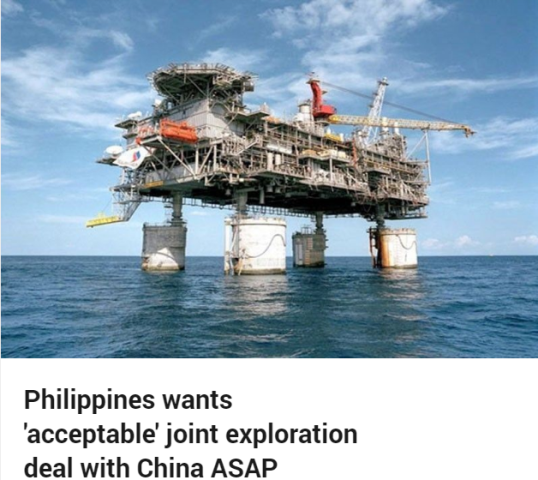Context Missing: Reporting the PH-China Joint Exploration Proposal

Screengrab from Philstar.com
EVERYONE SHOULD know by now about President Rodrigo Duterte’s “pivot to China.” Media reports have quoted him as citing economic benefits from it, among them loans and partnerships mainly on infrastructure construction. The media have also reported that the Philippines won its case at the International Arbitral Tribunal which rejected China’s claims to the West Philippine Sea and upheld the Philippines’ own. China’s building artificial islands and occupying reefs in Philippine waters have also been reported, but the supposed justifications for the government’s not challenging these intrusions have dominated the coverage.
But it doesn’t end there. The Duterte regime may have also entered into an agreement that will further compromise Philippine sovereignty in the form of the joint exploration with China of what are, according to the UN Tribunal, Philippine territorial waters and part of the exclusive economic zone.
Duterte and Chinese President Xi Jinping held a bilateral meeting on the sidelines of the Boao Forum for Asia held in Hainan, China last April 10. Foreign Affairs Secretary Alan Peter Cayetano later announced in a press briefing that the two heads of state had given the “go-signal” for their respective countries to draft a framework agreement for joint oil and gas exploration in the West Philippine Sea.
Bilateral talks are held behind closed doors, completely hidden from the public. Both primetime newscasts and the broadsheets have done little to bring to public attention the secrecy of these talks, and the entire forum’s being totally silent on the issues raised by China’s intrusion in Philippine seas.
The proposed joint exploration is not entirely surprising, since Cayetano said in February this year that the Philippines was “aggressively” pushing for it. Duterte himself said that one can call it an agreement on “co-ownership,” and “a much better option than fighting.”
Since Duterte took the presidency, Supreme Court Justice Antonio Carpio and former Solicitor General Florin Hilbay have been making their views on the subject known. Both have declared that joint exploration would encroach on the country’s sovereign rights, and would be unconstitutional. Both were part of the Philippine delegation that attended the oral arguments phase of the arbitration case in The Hague.
That context was noticeably absent in the coverage of Duterte’s latest visit to China.
CMFR monitored the top three broadsheets (Philippine Daily Inquirer, Manila Bulletin and The Philippine Star) and primetime newscasts (ABS-CBN 2’s TV Patrol, GMA-7’s 24 Oras, TV5’s Aksyon and CNN Philippines’ News Night) from April 10 to 13.
The TV networks did not discuss the joint exploration at all. They focused instead on what happened in the forum itself.
The Inquirer, Bulletin and the Star mentioned it, but only in connection with Cayetano’s announcement. (“Duterte, Xi to work out on joint oil exploration”; “PH, China working to finalize joint sea exploration agreement”; “Framework sought on joint gas exploration with China”).
The Bulletin published a separate report on Xi’s announcement in Xinhua News Agency that he had proposed joint development with the Philippines “at an appropriate time.” (“From sea of conflict to sea of cooperation, friendship”).
Other angles could have been examined to put the proposal in context. For instance, how similar or different is the proposal with the Joint Marine Seismic Undertaking (JMSU) with China and Vietnam favored by the Arroyo administration?
This was explained neither in print nor broadcast. But Philstar.com put it succinctly: “The legality of the agreement, which was inked during the time of President Gloria Macapagal-Arroyo, was challenged before the Supreme Court in 2008. The high court has not made a decision on the matter.” (“Philippines wants ‘acceptable’ joint exploration deal with China ASAP“).
Prior to the bilateral negotiations, some online reports quoted Chito Sta. Romana, Philippine Ambassador to China, as saying that the two countries are seeking a “legal and publicly acceptable” framework on the proposed exploration.
But what level of acceptability is possible when there has been so little transparency about the talks between Duterte and Xi Jinping? What can be expected of a foreign policy that seems determined to please the other side?
The media could have done better, but didn’t.
Leave a Reply